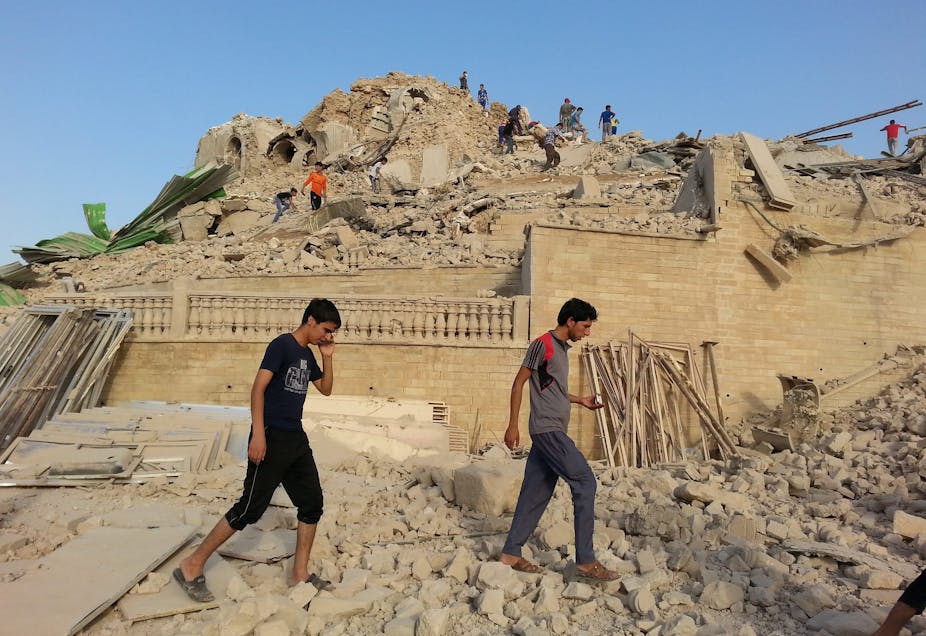Iraq previously had one of the most multicultural societies in the Middle East. A broad diversity of religions, races and cultures flourished in Iraq, united by common heritage, culture and traditions. Significant numbers of distinct communities continue to exist, but Iraq’s social diversity is disappearing as Islamic State (IS) fighters rampage through the country.
Few outside Iraq are aware the country has a black African minority, more than ten indigenous Christian denominations, a Jewish community, various ancient religions and several ethnicities that existed solely in Iraq until recent migration took them beyond their homeland’s borders. Examples of these groups include Yazdanism, Shabakism, Kakaeism and many more. Iraq has at least 30 distinct, identifiable enthno-religious groups.
Intercommunal harmony in Iraq began to unravel in the last decades of the 19th century as a consequence of political conflict between rival ideologies, coinciding with the decay of the Ottoman Empire. The “Sayfo” genocide, which began in the 19th century, claimed the lives of approximately 250,000 Assyrian Christians in northern Iraq and neighbouring areas in Turkey, Syria and Iran. In 1933, around 3000 Assyrians were slaughtered in the “Simele” genocide.
The most painful and shocking episode in Iraq’s multicultural history was the departure of its Jewish community. In just two decades, Iraq’s 120,000-strong Jewish minority, whose history dated back more than 26 centuries, disappeared. Many Jewish Iraqis were killed in a series of attacks from the 1950s.
The exact circumstances of this tragic episode in Iraq’s history is not entirely known and the origins of the bombing and intimidation of Iraq’s Jews remain unclear. Many Iraqis sincerely regret the loss of their Jewish neighbours. Some have even maintained contact with them and meet in other countries outside Iraq and Israel.
History is repeating itself today. Iraq’s Christian community has been reduced from 1.5 million to around 350,000 in the last decade. In recent days, Christians have been expelled from Mosul and IS forces have destroyed Christians’ holy places.
Moderate Islamic organisations formulated many initiatives to encourage Muslim families to shelter Christians following their expulsion from Mosul, yet this has not been enough to prevent the prospect of a Christian extinction in Iraq.
The situation of other minorities is similar to Christians in Iraq. Mandaeans, one of Iraq’s indigenous communities, are rapidly exiting the country. Around 80% left Iraq in recent decades. Just 5000 remain out of a total 70,000 who are spread across the world, including in Australia.
Today, Sydney’s Mandaean community matches Iraq’s in size. They have a unique religion, language and culture: a mixture of very ancient Iraqi beliefs, Christianity and other elements drawn from different periods of their long history.
Non-Muslims are not the only groups persecuted in Iraq. Shiite and Sunnis are persecuted in the regions dominated by other sects. IS militants have also killed great numbers of Turkish Shiite and Shabak people who live in and around Mosul in recent months, including many women and children.

Additionally, IS forces have killed a great number of Sunnis who oppose their extremist ideologies and practices. Hundreds of thousands of people from different ethnic-religious groups have abandoned their livelihoods and escaped areas under IS control. They are currently living in poor conditions in places bordering war zones.
Iraq’s identity had been interconnected with diversity. Holy sites that are being destroyed by IS are more than cultural tourist attractions. They have served as sites of tolerance and peaceful co-existence for a country whose fortunes have waxed and waned.
For example, the tomb of “Saint George” – which was destroyed a day after the shrine of the Prophet Jonah in Mosul – was revered by Muslims as well and even sometimes more than Christians. Saint George is a prophet for Muslims and a saint for Christians.
I have been to a number of churches that Muslims visited to pray, while Iraqi Christians have also previously participated in different Islamic celebrations. This clearly showed how Muslims and Christians, together with other Iraqi minorities, could interact positively and build a harmonious culture for all Iraqis.
What is happening in Iraq today is the severing of cultural, historical and social bridges that linked communities with one another to forge the Iraqi identity. Iraq is heading towards the total destruction of its historic and human legacy, which will turn it into a barren social desert isolated from its time-honoured cultural and religious history.
This diversity is disappearing very rapidly in the region and particularly in Iraq, along with other countries such as Syria. This crisis is leading to the loss of significant cultural heritages and local languages and reducing the levels of tolerance and interaction in the region.
Iraq needs urgent assistance from the international community. It is facing more than just a normal terrorist threat. What is occurring is the final death of a nation.

